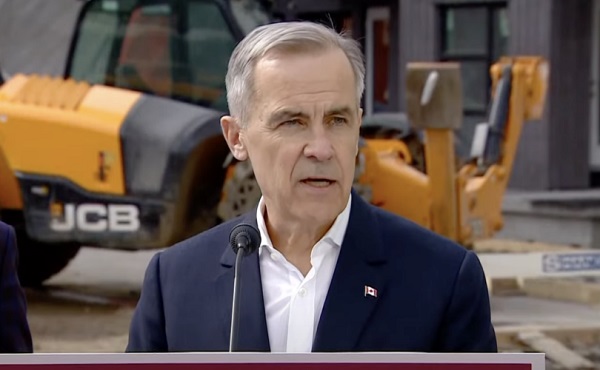Alberta
“Ontario Can’t do it Alone” – Fairness Alberta Expands with Eastern Canada Campaign

It has been just over four months since the launch of Fairness Alberta, a non-partisan Proudly Canadian, Fiercely Albertan organization, in May 2020. Fairness Alberta promotes education and discussion to combat biased government policies and regulations that restrict Alberta’s economic growth and prosperity. By highlighting Alberta’s $324 billion net contribution to the Canadian economy from 2000 to 2019, FA’s mandate is to “inform Canadians about the magnitude of the contributions Albertans make to Canada, while educating Canadian’s about the damaging fiscal, trade, energy, procurement, and infrastructure policies that chronically undermine Alberta’s – and Canada’s – potential.”

Dr. Bill Bewick, Director of Fairness Alberta
The public response to the organization throughout Alberta and across Canada has been overwhelmingly positive, according to Bill Bewick, Executive Director of Fairness Alberta. “Our factual approach is agreeable,” he says, “and even people who are skeptical of Alberta demanding more from the country are willing to listen and learn.”
On September 21, Fairness Alberta expanded into eastern Canada with the launch of their Fall 2020 Campaign in Ontario. The two-part billboard series in Toronto and Ottawa is designed to illustrate just how much Albertans have helped Ontarians carry the fiscal load in the federation over the last decade. “Many people are surprised by the fiscal contributions of each province given the size difference,” says Bewick, “people assume Ontario makes the biggest contribution, but that’s just not the case.”
From 2007-2018, Ontario contributed $98 billion net and Alberta contributed $240 billion net to the country, while the remainder of the provinces have received a combined total of $370 billion.
 As all Canadian provinces face the daunting road to recovery following the destructive economic impacts of COVID-19, the dissemination of accurate information regarding the crucial role of Alberta in the nation’s recovery remains crucial. Arguably even more so since the recent Throne Speech, delivered by Governor General Julie Payette on September 23, has been widely criticized for once again ignoring the contributions and needs of Albertans in favor of new policies that will further restrict productivity in Alberta by targeting natural gas.
As all Canadian provinces face the daunting road to recovery following the destructive economic impacts of COVID-19, the dissemination of accurate information regarding the crucial role of Alberta in the nation’s recovery remains crucial. Arguably even more so since the recent Throne Speech, delivered by Governor General Julie Payette on September 23, has been widely criticized for once again ignoring the contributions and needs of Albertans in favor of new policies that will further restrict productivity in Alberta by targeting natural gas.
Premiere Jason Kenney openly criticized the Throne Speech and the clean-fuel standard, stating, “We got a litany of policies that would strangle investment and jeopardize resource jobs when we most need the industry that generates 20 percent of government revenues in Canada” (1).
Fairness Alberta has responded similarly to developments from the recent Throne Speech, arguing that Alberta’s role in national recovery cannot be overstated or ignored. “Alberta is an engine in the fragile Canadian economy,” says Bewick, “If that productivity is hindered by the new clean fuel standards, no other province will be able to pick up the slack.”
The Ontario campaign is set to continue into the month of November, paired with online advertising that draws targeted audiences to their website, and the remainder of 2020 will see an expansion into British Columbia as Fairness Alberta continues to grow and fight for a fair deal for Alberta within Canada. Bewick believes that “there are millions of fair-minded Canadians out there and showing them the importance of Alberta’s economy is critical right now to ensure the federal government works with Alberta, not against it.”
For more information on Fairness Alberta, visit fairnessalberta.ca.
For more stories, visit Todayville Calgary.
2025 Federal Election
Next federal government should recognize Alberta’s important role in the federation

From the Fraser Institute
By Tegan Hill
With the tariff war continuing and the federal election underway, Canadians should understand what the last federal government seemingly did not—a strong Alberta makes for a stronger Canada.
And yet, current federal policies disproportionately and negatively impact the province. The list includes Bill C-69 (which imposes complex, uncertain and onerous review requirements on major energy projects), Bill C-48 (which bans large oil tankers off British Columbia’s northern coast and limits access to Asian markets), an arbitrary cap on oil and gas emissions, numerous other “net-zero” targets, and so on.
Meanwhile, Albertans contribute significantly more to federal revenues and national programs than they receive back in spending on transfers and programs including the Canada Pension Plan (CPP) because Alberta has relatively high rates of employment, higher average incomes and a younger population.
For instance, since 1976 Alberta’s employment rate (the number of employed people as a share of the population 15 years of age and over) has averaged 67.4 per cent compared to 59.7 per cent in the rest of Canada, and annual market income (including employment and investment income) has exceeded that in the other provinces by $10,918 (on average).
As a result, Alberta’s total net contribution to federal finances (total federal taxes and payments paid by Albertans minus federal money spent or transferred to Albertans) was $244.6 billion from 2007 to 2022—more than five times as much as the net contribution from British Columbians or Ontarians. That’s a massive outsized contribution given Alberta’s population, which is smaller than B.C. and much smaller than Ontario.
Albertans’ net contribution to the CPP is particularly significant. From 1981 to 2022, Alberta workers contributed 14.4 per cent (on average) of total CPP payments paid to retirees in Canada while retirees in the province received only 10.0 per cent of the payments. Albertans made a cumulative net contribution to the CPP (the difference between total CPP contributions made by Albertans and CPP benefits paid to retirees in Alberta) of $53.6 billion over the period—approximately six times greater than the net contribution of B.C., the only other net contributing province to the CPP. Indeed, only two of the nine provinces that participate in the CPP contribute more in payroll taxes to the program than their residents receive back in benefits.
So what would happen if Alberta withdrew from the CPP?
For starters, the basic CPP contribution rate of 9.9 per cent (typically deducted from our paycheques) for Canadians outside Alberta (excluding Quebec) would have to increase for the program to remain sustainable. For a new standalone plan in Alberta, the rate would likely be lower, with estimates ranging from 5.85 per cent to 8.2 per cent. In other words, based on these estimates, if Alberta withdrew from the CPP, Alberta workers could receive the same retirement benefits but at a lower cost (i.e. lower payroll tax) than other Canadians while the payroll tax would have to increase for the rest of the country while the benefits remained the same.
Finally, despite any claims to the contrary, according to Statistics Canada, Alberta’s demographic advantage, which fuels its outsized contribution to the CPP, will only widen in the years ahead. Alberta will likely maintain relatively high employment rates and continue to welcome workers from across Canada and around the world. And considering Alberta recorded the highest average inflation-adjusted economic growth in Canada since 1981, with Albertans’ inflation-adjusted market income exceeding the average of the other provinces every year since 1971, Albertans will likely continue to pay an outsized portion for the CPP. Of course, the idea for Alberta to withdraw from the CPP and create its own provincial plan isn’t new. In 2001, several notable public figures, including Stephen Harper, wrote the famous Alberta “firewall” letter suggesting the province should take control of its future after being marginalized by the federal government.
The next federal government—whoever that may be—should understand Alberta’s crucial role in the federation. For a stronger Canada, especially during uncertain times, Ottawa should support a strong Alberta including its energy industry.
Alberta
Province announces plans for nine new ‘urgent care centres’ – redirecting 200,000 hospital visits

Expanding urgent care across Alberta
If passed, Budget 2025 includes $17 million in planning funds to support the development of urgent care facilities across the province.
As Alberta’s population grows, so does the demand for health care. In response, the government is making significant investments to ensure every Albertan has access to high-quality care close to home. Currently, more than 35 per cent of emergency department visits are for non-life-threatening conditions that could be treated at urgent care centres. By expanding these centres, Alberta’s government is enhancing the health care system and improving access to timely care.
If passed, Budget 2025 includes $15 million to support plans for eight new urgent care centres and an additional $2 million in planning funds for an integrated primary and urgent care facility in Airdrie. These investments will help redirect up to 200,000 lower-acuity emergency department visits annually, freeing up capacity for life-threatening cases, reducing wait times and improving access to care for Albertans.
“More people are choosing to call Alberta home, which is why we are taking action to build capacity across the health care system. Urgent care centres help bridge the gap between primary care and emergency departments, providing timely care for non-life-threatening conditions.”
“Our team at Infrastructure is fully committed to leading the important task of planning these eight new urgent care facilities across the province. Investments into facilities like these help strengthen our communities by alleviating strains on emergency departments and enhance access to care. I am looking forward to the important work ahead.”
The locations for the eight new urgent care centres were selected based on current and projected increases in demand for lower-acuity care at emergency departments. The new facilities will be in west Edmonton, south Edmonton, Westview (Stony Plain/Spruce Grove), east Calgary, Lethbridge, Medicine Hat, Cold Lake and Fort McMurray.
“Too many Albertans, especially those living in rural communities, are travelling significant distances to receive care. Advancing plans for new urgent care centres will build capacity across the health care system.”
“Additional urgent care centres across Alberta will give Albertans more options for accessing the right level of care when it’s needed. This is a necessary and substantial investment that will eventually ease some of the pressures on our emergency departments.”
The remaining $2 million will support planning for One Health Airdrie’s integrated primary and urgent care facility. The operating model, approved last fall, will see One Health Airdrie as the primary care operator, while urgent care services will be publicly funded and operated by a provider selected through a competitive process.
“Our new Airdrie facility, offering integrated primary and urgent care, will provide same-day access to approximately 30,000 primary care patients and increase urgent care capacity by around 200 per cent, benefiting the entire community and surrounding areas. We are very excited.”
Alberta’s government will continue to make smart, strategic investments in health facilities to support the delivery of publicly funded health programs and services to ensure Albertans have access to the care they need, when and where they need it.
Budget 2025 is meeting the challenge faced by Alberta with continued investments in education and health, lower taxes for families and a focus on the economy.
Quick facts
- The $2 million in planning funds for One Health Airdrie are part of a total $24-million investment to advance planning on several health capital initiatives across the province through Budget 2025.
- Alberta’s population is growing, and visits to emergency departments are projected to increase by 27 per cent by 2038.
- Last year, Alberta’s government provided $8.4 million for renovations to the existing Airdrie Community Health Centre.
Related information
-

 Business1 day ago
Business1 day agoFeds Spent Roughly $1 Billion To Conduct Survey That Could’ve Been Done For $10,000, Musk Says
-

 Alberta18 hours ago
Alberta18 hours agoPhoto radar to be restricted to School, Playground, and Construction Zones as Alberta ends photo radar era
-

 2025 Federal Election2 days ago
2025 Federal Election2 days agoChinese Gangs Dominate Canada: Why Will Voters Give Liberals Another Term?
-

 Health21 hours ago
Health21 hours agoRFK Jr. Drops Stunning Vaccine Announcement
-

 Alberta13 hours ago
Alberta13 hours agoProvince announces plans for nine new ‘urgent care centres’ – redirecting 200,000 hospital visits
-

 Business10 hours ago
Business10 hours agoElon Musk, DOGE officials reveal ‘astonishing’ government waste, fraud in viral interview
-

 Energy2 days ago
Energy2 days agoEnergy, climate, and economics — A smarter path for Canada
-

 Alberta2 days ago
Alberta2 days agoAlberta Institute urging Premier Smith to follow Saskatchewan and drop Industrial Carbon Tax






